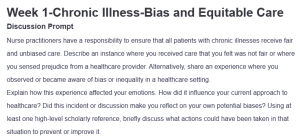Week 1-Chronic Illness-Bias and Equitable Care
During a routine check-up a few years ago, I encountered a situation that left a lasting impression on my perception of healthcare bias. As a patient with a chronic illness, I am accustomed to frequent medical visits. On this occasion, however, I felt that the care I received was not fair. The healthcare provider seemed dismissive of my symptoms, attributing them to stress without thorough examination or consideration of my medical history. This experience left me feeling frustrated and undervalued as a patient. I sensed a prejudice that my symptoms were less credible due to their subjective nature, which significantly affected my trust in the provider’s ability to offer comprehensive care.
This incident has profoundly influenced my approach to healthcare. As a nurse practitioner, I am now more vigilant about ensuring my patients feel heard and validated. I strive to create an environment where each patient’s concerns are taken seriously, regardless of how they appear initially. This experience made me reflect deeply on my potential biases and the importance of continuous self-assessment and education to provide equitable care.
Reflecting on this incident, one significant action that could have improved the situation would have been the implementation of implicit bias training for healthcare providers (Shah & Bohlen, 2023). Such training helps recognize and mitigate subconscious prejudices that may affect patient care. According to a study by Gopal et al. (2021), implicit bias training can lead to more equitable healthcare outcomes by enhancing provider awareness and promoting empathy in clinical practice. This approach not only improves patient satisfaction but also fosters a more inclusive healthcare environment.
References
Gopal, D., Chetty, U., O’Donnell, P., Gajria, C., & Blackadder-Weinstein, J. (2021). Implicit bias in healthcare: Clinical practice, research and decision making. Future Healthcare Journal, 8(1), 40–48. https://doi.org/10.7861/fhj.2020-0233
Shah, H. S., & Bohlen, J. (2023, March 4). Implicit Bias. PubMed; StatPearls Publishing. https://www.ncbi.nlm.nih.gov/books/NBK589697/
Week 1-Chronic Illness-Bias and Equitable Care
Discussion Prompt
Nurse practitioners have a responsibility to ensure that all patients with chronic illnesses receive fair and unbiased care. Describe an instance where you received care that you felt was not fair or where you sensed prejudice from a healthcare provider. Alternatively, share an experience where you observed or became aware of bias or inequality in a healthcare setting.
Explain how this experience affected your emotions. How did it influence your current approach to healthcare? Did this incident or discussion make you reflect on your own potential biases? Using at least one high-level scholarly reference, briefly discuss what actions could have been taken in that situation to prevent or improve it.
Expectations
Initial Post:

Week 1-Chronic Illness-Bias and Equitable Care
- Length: A minimum of 250 words, not including references
- Citations: At least one high-level scholarly reference in APA from within the last 5 years
